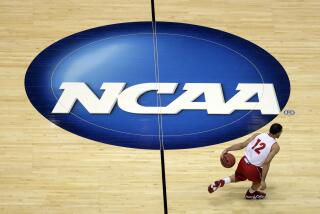Gambling by Athletes Is on the Rise
- Share via
Nearly half of male college athletes gamble on sports, and about one in 20 have gone so far as to bet on their own games, leak insider information or shave points, according to a report released Monday.
The University of Michigan survey, conducted over the last 18 months, also found that 72% of student athletes--male and female--have gambled in some way while in college. Four of five male student athletes have gambled in some manner.
The study sought to provide a comprehensive examination of gambling among college athletes--an issue that has drawn increased attention with gambling scandals erupting in 1998 at Northwestern, in 1997 at Arizona State and in 1996 at Boston College.
But even the study’s principal researchers, Michigan Assistant Athletic Directors Michael E. Cross and Ann G. Vollano, noted its significant limitation: Only 758 athletes took part in the survey, a paper-and-pencil questionnaire sent unannounced via regular mail to 3,000 football and basketball players at Division I schools.
A higher response rate, they wrote in the report, would have been “desirable.” And, they wrote, it’s unclear whether the study under- or over-reports the prevalence of gambling among student athletes.
Experts said Monday the survey should nonetheless alarm anyone concerned about the integrity of college athletics.
“Colleges have their head in the sand,” said Arnie Wexler, a New Jersey expert on sports-related gambling and a former gambler. “They don’t want to believe there’s a problem on their campus. They’re deathly afraid of gambling, afraid it’s going to ruin the image of sports and the integrity of sports.
“The denial is so pervasive,” added Wexler, who speaks regularly to college teams. He also runs a counseling hotline and says 12% of the calls “come from kids under 21.”
Speaking over the weekend in San Antonio at the NCAA’s annual convention, NCAA President Cedric Dempsey urged that universities “turn up the heat” and crack down on gambling. He said, “I challenge you to send a clear message that your athletics programs will not be used as the poker stake in sports wagering and point shaving.”
Though gambling problems have dogged college sports for decades--dating back to a 1951 college basketball game-fixing scandal that most notably involved City College of New York and several other New York schools--formal research into the issue has been limited.
In a 1996 study of college football and male basketball players by two professors at the University of Cincinnati, 25% of those surveyed admitted to betting on athletic events. Three of 648 respondents said they had taken money from a gambler to play poorly.
The Michigan survey sent 3,000 questionnaires to a sample of Division I athletes at 182 schools. Of those schools, 148 field football teams.
Half the 3,000 questionnaires were sent to football players. The rest were sent to basketball players, 750 men and 750 women. The response rate of 758 translates to 25.3%.
The study found that:
* 35% of all athletes and 45% of male athletes had gambled on sports since entering college.
* 7% of male athletes had bet either with a bookie or by using a parlay card.
* Among male athletes, 5.2% said they had fixed a game in which they took part, bet on a game in which they participated or provided inside information for gambling purposes.
“Anything above zero is too many,” researcher Vollano said. “I was very surprised at the 5%.”
More to Read
Sign up for Essential California
The most important California stories and recommendations in your inbox every morning.
You may occasionally receive promotional content from the Los Angeles Times.













